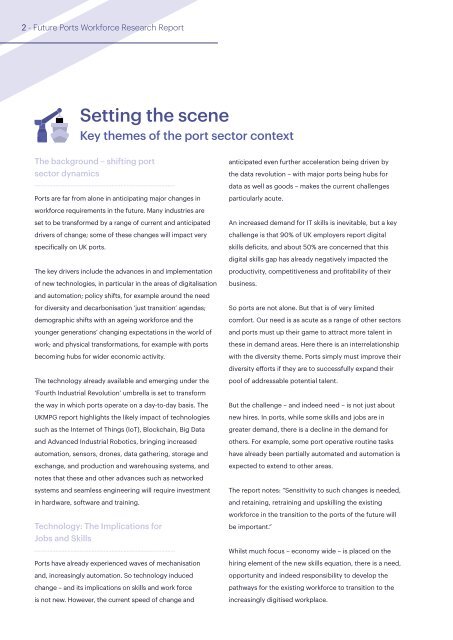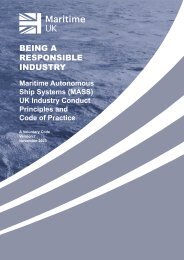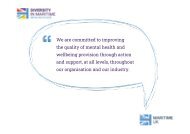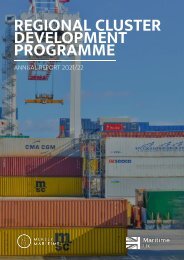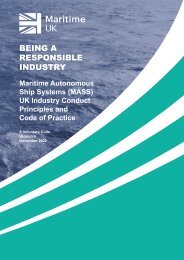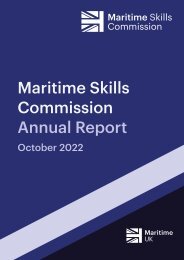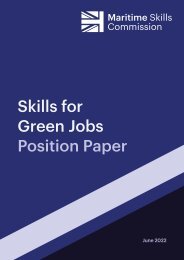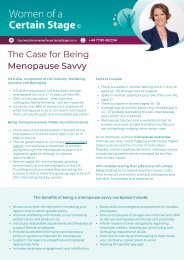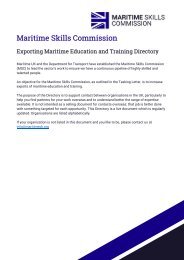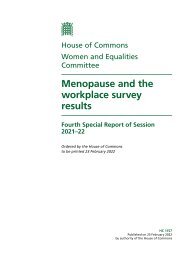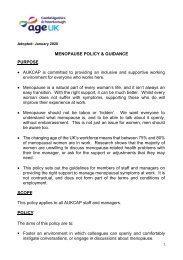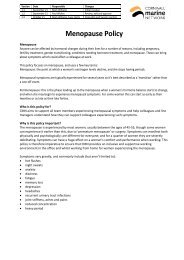Maritime Skills Commission - Future Ports Workforce Research Report - March 2022
Create successful ePaper yourself
Turn your PDF publications into a flip-book with our unique Google optimized e-Paper software.
2 - <strong>Future</strong> <strong>Ports</strong> <strong>Workforce</strong> <strong>Research</strong> <strong>Report</strong><br />
Setting the scene<br />
Key themes of the port sector context<br />
However, it is important to remember there will<br />
The background – shifting port<br />
sector dynamics<br />
<strong>Ports</strong> are far from alone in anticipating major changes in<br />
workforce requirements in the future. Many industries are<br />
set to be transformed by a range of current and anticipated<br />
drivers of change; some of these changes will impact very<br />
specifically on UK ports.<br />
The key drivers include the advances in and implementation<br />
of new technologies, in particular in the areas of digitalisation<br />
and automation; policy shifts, for example around the need<br />
for diversity and decarbonisation ‘just transition’ agendas;<br />
demographic shifts with an ageing workforce and the<br />
younger generations’ changing expectations in the world of<br />
work; and physical transformations, for example with ports<br />
becoming hubs for wider economic activity.<br />
The technology already available and emerging under the<br />
‘Fourth Industrial Revolution’ umbrella is set to transform<br />
the way in which ports operate on a day-to-day basis. The<br />
UKMPG report highlights the likely impact of technologies<br />
such as the Internet of Things (IoT), Blockchain, Big Data<br />
and Advanced Industrial Robotics, bringing increased<br />
automation, sensors, drones, data gathering, storage and<br />
exchange, and production and warehousing systems, and<br />
notes that these and other advances such as networked<br />
systems and seamless engineering will require investment<br />
in hardware, software and training.<br />
Technology: The Implications for<br />
Jobs and <strong>Skills</strong><br />
<strong>Ports</strong> have already experienced waves of mechanisation<br />
and, increasingly automation. So technology induced<br />
change – and its implications on skills and work force<br />
is not new. However, the current speed of change and<br />
anticipated even further acceleration being driven by<br />
the data revolution – with major ports being hubs for<br />
data as well as goods – makes the current challenges<br />
particularly acute.<br />
An increased demand for IT skills is inevitable, but a key<br />
challenge is that 90% of UK employers report digital<br />
skills deficits, and about 50% are concerned that this<br />
digital skills gap has already negatively impacted the<br />
productivity, competitiveness and profitability of their<br />
business.<br />
So ports are not alone. But that is of very limited<br />
comfort. Our need is as acute as a range of other sectors<br />
and ports must up their game to attract more talent in<br />
these in demand areas. Here there is an interrelationship<br />
with the diversity theme. <strong>Ports</strong> simply must improve their<br />
diversity efforts if they are to successfully expand their<br />
pool of addressable potential talent.<br />
But the challenge – and indeed need – is not just about<br />
new hires. In ports, while some skills and jobs are in<br />
greater demand, there is a decline in the demand for<br />
others. For example, some port operative routine tasks<br />
have already been partially automated and automation is<br />
expected to extend to other areas.<br />
The report notes: “Sensitivity to such changes is needed,<br />
and retaining, retraining and upskilling the existing<br />
workforce in the transition to the ports of the future will<br />
be important.”<br />
Whilst much focus – economy wide – is placed on the<br />
hiring element of the new skills equation, there is a need,<br />
opportunity and indeed responsibility to develop the<br />
pathways for the existing workforce to transition to the<br />
increasingly digitised workplace.<br />
still be a need for a ‘baseload’ of more traditional<br />
skills, it says. Even where demand for some jobs<br />
and skills is shrinking, replacement demand will<br />
be significant.<br />
The Challenge and Opportunity<br />
of Diversity<br />
As in many other ‘traditional’ industries, there is a<br />
relative lack of diversity in UK ports – gaining access<br />
to a more diverse, and therefore wider, talent pool is<br />
vital in terms of addressing the current demographic<br />
profile, tackling skills gaps and meeting future<br />
needs.<br />
There is a determined push across many port<br />
operators to attract and retain a more gender diverse<br />
future ports workforce. This makes sense purely in<br />
business terms; <strong>Maritime</strong> UK has noted that more<br />
diverse companies are better able to attract top<br />
talent and improve their customer and employee<br />
satisfaction and decision making, “leading to a<br />
virtuous cycle of increasing returns”.<br />
However, gendered stereotypes and biased<br />
assumptions are often embedded within workplace<br />
cultures and can have an impact on recruitment<br />
selection decisions and work practices.<br />
There is also a need for better portrayal or ‘branding’<br />
of the industry, the roles it offers and the modern<br />
port as a workplace in order to attract a more diverse<br />
range of talent, including the younger generation.<br />
The sector recognises the challenge. Determined<br />
efforts to meet this challenge are underway. But more<br />
needs to be done, both at a port operator and<br />
sector level.


